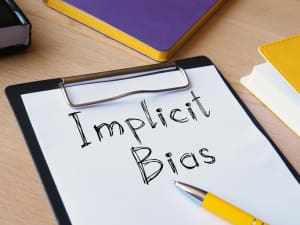
The Impact of Implicit Bias
$45.00
This training explores the concept of implicit bias, its impact on our actions and decisions, and strategies for recognizing and addressing it. Participants will engage in discussions and activities to increase self-awareness and foster a mindset of inclusivity and respect.
Upon completion of this training, learners will be able to:
- Define implicit bias and explain its influence on decision-making and behavior.
- Identify personal and systemic biases and their potential impacts on interactions.
- Develop strategies to challenge and reframe biased thoughts.
- Promote inclusive practices by fostering curiosity and honoring differences.
Social workers completing this course receive 3 General/Implicit Bias asynchronous continuing education credits.
For other board approvals, this course qualifies for 3 hours of General Skill Building and or Implicit Bias continuing education training.
Course Instructor: Yolanda Brown-Spidell, MA, CTRT
Recording Date: 03/01/2024
Recorded Live Webinar with downloadable presentation slides and/or handouts, evaluation, and a required quiz. The learner is required to pass with a 70% or higher to achieve the CE certificate of completion. The learner is able to reset the test until a satisfactory score is achieved. CE Training Workshops, LLC, provider #1770, is approved as an ACE provider to offer social work continuing education by the Association of Social Work Boards (ASWB) Approved Continuing Education (ACE) program. Regulatory boards are the final authority on courses accepted for continuing education credit. ACE provider approval period: 8/2/2022 – 8/2/2025. CE Training Workshops, LLC has been approved by NBCC as an Approved Continuing Education Provider, ACEP No. 7091. Programs that do not qualify for NBCC credit are clearly identified. CE Training Workshops, LLC is solely responsible for all aspects of the programs. System Requirements: Firefox, Chrome, Brave, Safari, Edge on any modern operating system (Windows, MacOS, Linux, Android, iOS). A desktop browser is recommended. We do not provide support resources for issues encountered using a mobile device. For more information about our policies and board approval statements, please visit our FAQS page.
Yolanda Brown-Spidell, MA, CTRT, MACC, is a mom, educator, sociologist, parent advocate, and the Executive Director of Eaglets Educational Consulting Firm, LLC. She has been an educator for over 20 years. She holds a Master’s degree from National University in human behavioral psychology.
The Impact of Implicit Bias (3 HR) Syllabus
I. Foundations of Implicit Bias
- Biases are universal and rooted in subconscious mental shortcuts
- Implicit bias differs from explicit bias; it is unintentional and automatic
- Affects perceptions, decisions, and behaviors even in helping professions
- Understanding the evolutionary and psychological origins of bias
II. The Impact of Bias in Practice
- Bias shapes how we interpret behaviors and narratives of those we serve
- Harm occurs when biases go unexamined or unchallenged
- Reflection on personal and systemic consequences of unchecked bias
- Power dynamics and professional responsibility in mitigating bias
III. Cultural Scripts and Self-Awareness
- Influence of upbringing, media, and culture on belief systems
- Internal narratives drive external responses
- Journaling and reflection as tools for exploring ingrained assumptions
- Heightening awareness of internal dialogue to seek clarity and empathy
IV. Language and Framing
- Labels influence perception and treatment of others
- Reframing stories to shift from judgment to understanding
- Words carry power: how we speak about people shapes how we treat them
- Moving from deficit language to strengths-based descriptions
V. Microaggressions and Unintended Harm
- Microaggressions are subtle, often unintentional slights rooted in bias
- Impact vs. intent: harm can exist regardless of good intentions
- Practicing accountability when confronted with feedback
- Importance of listening, validating, and adjusting behavior
VI. Critical vs. Curious Mindset
- Asking open-ended questions vs. making assumptions
- Curiosity allows for connection, while judgment creates barriers
- Engaging with difference through empathy and inquiry
- Reflecting on automatic thoughts before responding
VII. Honoring Psychological Safety
- Safety is subjective, emotional, and self-defined
- Everyone deserves to feel secure and valued in all environments
- Creating inclusive spaces requires proactive respect and validation
- Supporting safety for self and others through authentic presence
VIII. Challenging Internalized Bias
- Everyone holds biases—owning them is the first step to change
- Discomfort is part of the learning and unlearning process
- Growth comes from sitting with difficult truths, not avoiding them
- Reflective practices help recognize and shift biased thinking
IX. Effective Communication and Support
- Statements that validate vs. invalidate grief, struggle, or identity
- Examples of helpful vs. harmful language
- Practicing mindful and compassionate responses
- Acknowledging difference without diminishing it
X. Commitment to Growth and Equity
- The journey of addressing implicit bias is ongoing
- Commit to continued learning and intentional self-examination
- Use tools like journaling and dialogue to deepen understanding
- Strive for alignment between values, language, and actions


